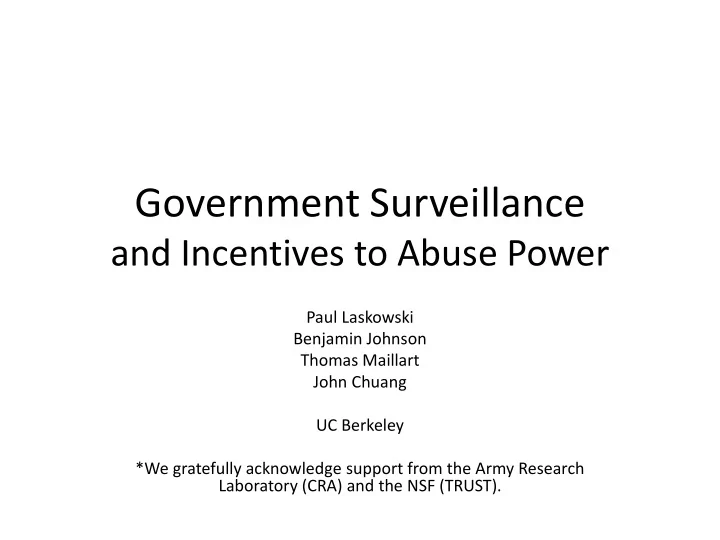

Government Surveillance and Incentives to Abuse Power Paul Laskowski Benjamin Johnson Thomas Maillart John Chuang UC Berkeley *We gratefully acknowledge support from the Army Research Laboratory (CRA) and the NSF (TRUST).
A Growing Surveillance Apparatus?
The Debate over Surveillance • Proponents maintain that surveillance is vital to prevent terrorist attacks and other crimes. • Opponents say that surveillance erodes privacy and enables totalitarian states. – Many abuses of power rely on data surveillance for their effectiveness. • Blackmail, bias political speech, secret assassinations, targeting of sympathizers
Research Questions Underlying the debate, some questions rooted in individual incentives: • How does surveillance affect incentives for governments to abuse power? • How does surveillance affect the odds of governmental change or revolution? • What level of surveillance maximizes the welfare of citizens?
Modeling Approach • A government wants to minimize its chances of losing power to an opposition . The surveillance level. Capabilities and deployment of surveillance technology. Abuse of power. Use of government power in excess of moral or ethical standards of conduct. Government popularity. Opposition popularity. Probability the government loses power.
Directional Assumptions Assumption Interpretation ¶ ( V G - V O ) A = 0 > 0 Initial amounts of abuse harm the opposition more than ¶ A they harm the government. ¶ ( V G - V O ) At high levels of abuse, increasing abuse further harms the A = 1 < 0 ¶ A government more than the opposition. " A , ¶ 2 The marginal benefit of extra abuse to the government is ¶ A 2 [ V G - V O ] < 0 decreasing. " S , " A , ¶ ¶ Surveillance makes abuse more effective, by harming the ¶ A [ V G - V O ] > 0 ¶ S opposition more, or harming the government less. ¶ p The probability of change decreases with the popularity ¶ ( V G - V O ) < 0 gap. Result 1: There is a unique abuse level, A *, that minimizes p . Result 2: A * increases with S - But is that good or bad for citizens?
Citizen-Based Model • A unit mass of citizens with uniformly distributed type parameter • The type of a citizen determines her utility under the government and the opposition. • Let D be the demand for change, the amount of citizens that prefer the opposition. • We choose functional forms for V G and V O that follow our directional assumptions:
Key Results • Result 7: If V G < V O increased surveillance necessarily decreases welfare. • Result 8: If V G > V O increased surveillance may decrease or increase welfare. • Intuition: Increasing surveillance has two effects: 1. Abuse decreases popularity of both government and opposition. 2. Government change is less likely. When V O > V G both effects hurt citizens. But when V G > V O surveillance prevents a transition to a less-liked opposition.
Welfare as a Function of Surveillance Opposition is Government is likely to take over firmly entrenched. Probability of from government. Further abuse takeover drops Abuse lowers mainly decreases rapidly. Benefit of popularity of utility of the keeping a popular opposition, government. government driving down dominates negative welfare. effects of abuse. 1 L G = 0.25 p = 1 + e 100(1/3 - D )
Discussion • Our stylized model highlights a few key effects – Surveillance increases the rational level of abuse of power. – Surveillance may increase welfare when it allows a popular government to stay in power. – A government that wants to stay in power will always want to increase surveillance. • Many directions for future research – A more realistic distribution of consumers. – Institutional checks on surveillance. E.g. FISA courts, sousveillance. – A government with multiple opponents. E.g. a political opposition and armed revolutionaries. – Domestic versus foreign surveillance.
Questions?
Recommend
More recommend